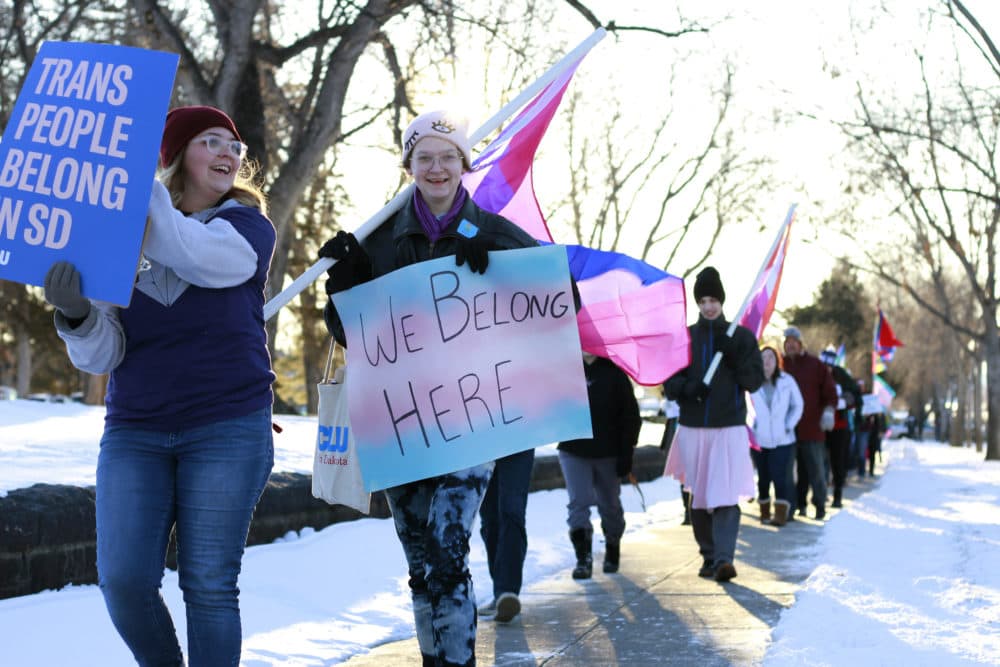Advertisement
Commentary
I’m A Physician. Don’t Legislate Health Care For Transgender Patients

This week, a patient walked into my office beaming. He is a transgender teenager who recently started on testosterone, and he had good news to share. He was thrilled with the ways in which his body was changing, beginning to look as he had always imagined it would.
But he was equally excited about another new development. “My grandfather finally used he/him pronouns!” he said, as he and his mother grinned at each other, elated. It had been several years since he had come out as a trans guy, and one of the most important people in his life finally accepted him, exactly as he is.
A recent surge in legislation targeting transgender children and adolescents is, however, a somber reminder that in many parts of the country, the joy emanating from my patient and his mother would have been tempered by fear. Earlier this month, over the objections of Republican Gov. Asa Hutchinson and thousands of advocates for transgender youth, the Arkansas legislature voted to make gender-related care inaccessible to transgender people under the age of 18. Though Arkansas is the first state in the country to completely ban healthcare for transgender youth, nine states (Ala., Fla., La., Mo., Mont., N.C., S.C., Tenn., and Texas) are imminently poised to follow suit.
The specific details of the proposed legislation vary slightly by state. Many legislatures are considering bills like Arkansas’ which would make it illegal for doctors to provide any gender-related medical care to youth under 18. This means that doctors would be unable to prescribe puberty blockers: safe, reversible medications that stop the development of puberty-associated physical changes such as voice change, beard growth and menstrual periods, all of which can be tremendously distressing to transgender youth. By the time these medications would be available to the thousands of children and adolescents who stand to lose care if these bills become law, the window for their use will have long since closed.
This kind of legislation condemns transgender young people to experience unwanted physical changes that are either irreversible, or only modifiable with costly, painful surgical procedures.
Several states are also considering legislation which would specifically target families of transgender youth, by imposing penalties on parents/guardians who help their minor children get medical care related to gender.
In many cases, the legislators introducing these bills admit to ignorance when pressed on the rationale for targeting transgender youth. During the debate about Alabama’s proposed transgender health care ban, the bill’s sponsor admitted he did not know a transgender person and was not aware that gender-affirming healthcare was even being provided in Alabama.
As clinicians, we do know transgender and gender-diverse youth. These children and adolescents come to our clinics distressed because they cannot live as their true selves. This discomfort is not inherent to who they are; like all kids, they would prefer not to have to worry about how the world perceives their bodies, clothes, hair and voice.
Advertisement
This is why pediatric doctors object to medical bans: these bills take away parents’ ability to provide the support that their transgender children need to survive.
The distress they feel is a product of the hostile and discriminatory practices that they see around them, and it drastically diminishes when they feel supported and affirmed by their parents and guardians. The medical and mental health care we as clinicians provide allows us to partner with transgender children, adolescents and their families to help kids live in bodies that match their gender identity.
This is why pediatric doctors object to medical bans: these bills take away parents’ ability to provide the support that their transgender children need to survive. Transgender health care bans prevent parents from pursuing medical care that reduces the likelihood that their children will experience suicidal thoughts and improves their quality of life. Hundreds of health care providers have denounced such legislation and the misconceptions that underlie it.
Transgender teenagers living in Arkansas right now should be worrying about their math homework, getting to soccer practice, what is for lunch and whom to ask to prom. Like my patient, they and their families should be celebrating the fact that they can be who they truly are. Instead, these young people are anxiously asking their parents where they will find the medical care that allows them to feel comfortable and confident in their bodies.
In a year fraught with so much tragedy, lawmakers must stop attacking the rights of transgender youth and instead direct their efforts towards fostering inclusive, safe communities where differences are celebrated, and where all children, adolescents and young adults are granted the same opportunities to thrive.
Written in consultation with Stephanie Roberts, Ariel Frey-Vogel, Ellis Barrera, and Dallas Ducar.